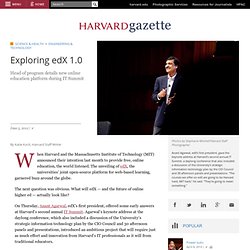

Vol 17, No 1 (2013) New and Newly Accessible Publications in Digital Humanities « Rebecca Frost Davis. Directory of Open Access Journals in Education from the Education Research Global Observatory. September/October 2012: In This Issue. The International Review of Research in Open and Distance Learning. Educational Technology Journals. Journal of Educational Technology & Society. Active Learning in Higher Education. Vision. The Lookstein Center for Jewish Education.
Informing the Public about Education through Quality Journalism. MediaShift. Articles by McKinsey Quarterly: Online business journal of McKinsey & Company. Business Management Strategy - Corporate Strategy - Global Business Strategy. Edsurge. Exploring edX 1.0. When Harvard and the Massachusetts Institute of Technology (MIT) announced their intention last month to provide free, online education, the world listened.

The unveiling of edX, the universities’ joint open-source platform for web-based learning, garnered buzz around the globe. The next question was obvious. What will edX — and the future of online higher ed — actually look like? On Thursday, Anant Agarwal, edX’s first president, offered some early answers at Harvard’s second annual IT Summit. Agarwal’s keynote address at the daylong conference, which also included a discussion of the University’s strategic information technology plan by the CIO Council and 30 afternoon panels and presentations, introduced an ambitious project that will require just as much effort and innovation from Harvard’s IT professionals as it will from traditional educators. Anne Margulies, Harvard’s chief information officer, kicked off the summit at Sanders Theatre. “Immediate feedback is huge,” he said.
How to Manage Your Smartest, Strangest Employee - Jeff Stibel. The Journal of Asynchronous Learning Networks (JALN) Higher Education News, Career Advice, Events and Jobs. Harvard Business Review Magazine. JOLT - Journal of Online Learning and Teaching. Jacqueline A.

Gilbert Professor of Management Department of Management & Marketing Jennings A. Jones College of Business Murfreesboro, TN 37130 USA jgilbert@mtsu.edu Ricardo Flores-Zambada Director Recursos Humanos del Sistema Tecnológico de Monterrey Monterrey, Neuvo Leon MX 64849 riflores@itesm.mx Introduction Online and hybrid learning environments are relative newcomers to the world of higher education. As Graham (2006) explains, there is now an emphasis on introducing a “human” dimension to technologies, like virtual communities, portable digital devices, instant messaging, and blogging.
Eveleth and Baker-Eveleth (2003) present a compelling framework and design for the inclusion of an online component inside a traditional face-to-face classroom. In the course described within this manuscript, students developed a set of core competencies which were designed to give them a strategic workforce advantage over individuals who had not had similar exposure. Step by Step Design. MERLOT Pedagogy Portal. Aiming for the Young Crowd, Google Pitches a Google+ Summer Camp - Mike Isaac - Social. Kids driving you nuts, now that school is out? Google announced an online summer camp on Monday, a collaboration with Make magazine that matches teens with maker-movement celebrities through the Google+ social network.
Using the company’s Hangouts video group chat tool, kids age 13 through 18 can watch makers create projects online, many of which are composed of stuff lying around the house (think Mentos and erupting Coke bottles). The “camp” lasts for six weeks, on Monday through Thursday mornings, with most Hangouts run by teenage camp counselors when the celebrities aren’t guest-starring. It’s one in another series of moves by Google to bolster Google+, its heavily pitched yet questionably populated social network. Lobbying big brands like Make can give prospective newcomers to Google+ an actual reason to go to the site. There’s potential to reach a large, lucrative market by targeting teens: To “attend” the camp, the kids must have a Google+ account.